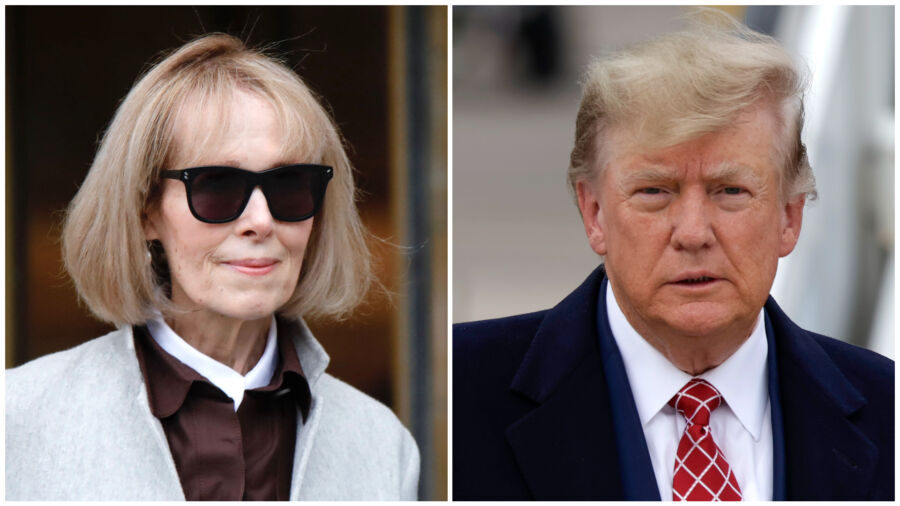A three-judge panel at the Second Circuit U.S. Court of Appeals has denied former President Donald Trump’s latest attempt to dismiss the civil lawsuit writer that E. Jean Carroll brought against him.
Ms. Carroll’s attorneys applauded the Dec. 13 decision, which allows the upcoming Jan. 16, 2024 trial in U.S. District Court to proceed. President Trump’s attorneys signaled that they could still avoid trial by petitioning the U.S. Supreme Court.
“We are pleased that the Second Circuit affirmed Judge Kaplan’s rulings and that we can now move forward with trial next month on January 16,” Robbie Kaplan, attorney for the plaintiff, told media outlets.
Alina Habba, defense attorney, conversely stated, “The Second Circuit’s ruling is fundamentally flawed and we will seek immediate review from the Supreme Court.”
Ms. Carroll sued President Trump in 2019 for defamation after she publicly alleged that he sexually assaulted her at a department store and he publicly denied the allegations in an official statement and to the press.
When New York State later passed the Adult Survivors Act to allow victims of sexual offenses to sue outside of the statute of limitations for one year, Ms. Carroll brought a second lawsuit against President Trump accusing him of “rape.”
Earlier this year, a jury found President Trump guilty of “sexual battery.” U.S. District Court Judge Lewis Kaplan then found President Trump guilty of defamation in the first case Ms. Carroll brought, ruling that the upcoming trial will deal only with the damages President Trump will have to pay.
President Trump had previously made several attempts to have the case thrown out and has said he will be appealing the ruling in the other case brought by Ms. Carroll as well. He maintains that the incident she spoke of, in the 1990s at Bergdorf Goodman, never happened.
President Trump has also argued that his statements were not defamatory and did not cause injury to Ms. Carroll’s trade, business, or profession. But the appellate court declined to rule on the issue, writing that the district court retains jurisdiction.
In the Dec. 13 order, the appeals court affirmed Judge Kaplan’s July and August decisions to deny President Trump the use of presidential immunity as a defense and remand the case back to the district court to proceed to trial.
“We hold that presidential immunity is waivable and that Defendant waived this defense,” the appeals court wrote.
Presidential Immunity
Presidential immunity is at the heart of several of these attempts to dismiss the case. In October, the appeals court heard oral arguments on whether this defense was waivable, in advance of issuing a ruling on whether the district court’s decision that President Trump had indeed waived it was correct.
President Trump did not begin his defense by asserting presidential immunity when he was first sued in 2019—while he was still in office.
He had invoked other defenses, including the anti-SLAPP (strategic lawsuit against public participation) defense first. It would be three years until he raised the immunity defense.
The district court also said President Trump had waived that defense by litigating the case and countersuing Ms. Carroll, and therefore could not reassert it later. President Trump’s defamation lawsuit against Ms. Carroll had been dismissed.
Attorneys for Ms. Carroll argued that people who believe they are “absolutely immune” do not behave the way President Trump has in his legal defense.
Appellate court judges had been skeptical during the hearing that presidential immunity could not be waived, pointing out that this would prevent presidents from countersuing if they wished to do so.
Defense attorneys argued that the immunity cuts one way—that it protects presidents from civil suits but does not deny them the opportunity to litigate.
In the new opinion and order, Judge José Cabranes wrote for the panel that they upheld the district court’s view that it was a waivable defense because if it wasn’t, then presidents couldn’t countersue, which would then allow the judicial branch to encroach on the powers of the executive branch.
“We conclude that under the singular circumstances presented here, considerations of judicial economy and efficiency favor the District Court’s retention of jurisdiction,” Judge Cabranes wrote.
The defense is expected to bring the question of whether presidential immunity can be waived to the U.S. Supreme Court for a petition for a writ of certiorari before judgment.
From The Epoch Times


